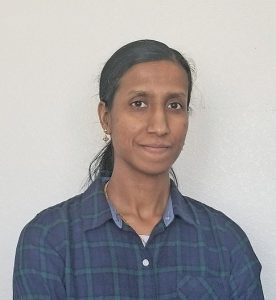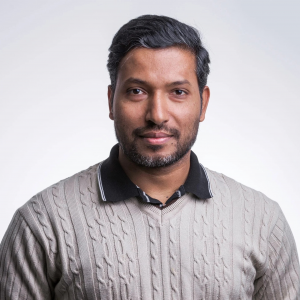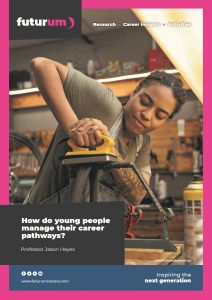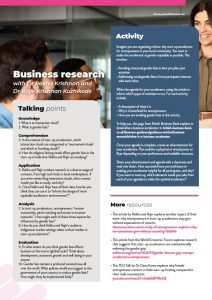Rituals that build, break, include or exclude: the hidden dynamics of start-up life
Entrepreneurship involves navigating uncertainty, managing visibility and building trust. While these dynamics are widely acknowledged, the subtle interaction rituals that shape who receives support – and who gets left out – often go unnoticed. Dr Rekha Krishnan and Dr Rajiv Krishnan Kozhikode, from Simon Fraser University in Canada, study how interaction rituals influence cooperation, exclusion and inequality in start-up ecosystems, particularly during the formative early stages of a venture.
Talk like a business researcher
Accelerator — a business programme that supports start-ups, principally through mentorship and networking opportunities
Capital — the finances or financial assets that enable a business to run
Entrepreneur — a person who creates a business based on a new idea or product and who is willing to take professional risks to make their business a success
Ethnographic — related to the study of cultures
Gender bias — prejudice towards a particular gender
Interaction ritual — a focused, standardised form of social, interpersonal interaction
Pitch — a formal bid to gain a business contract, often in the form of a presentation or face-to-face meeting
Silicon Valley — an area in California, in the US, famous for its innovative technology businesses
Start-up — a newly-established business
Entrepreneurship is shaped not only by ideas and investment, but by everyday social interactions. Sister and brother research team Dr Rekha Krishnan and Dr Rajiv Krishnan Kozhikode, based at Simon Fraser University, study how interaction rituals – such as pitch sessions, peer feedback and informal bonding – shape trust, cooperation and exclusion in start-up ecosystems. Their work focuses on how social order emerges and evolves in these high-pressure environments, and how certain rituals can quietly include or exclude people. While Rekha and Rajiv’s work is rooted in understanding how these rituals build or fragment entrepreneurial communities, it also sheds light on how gender norms and biases can be reinforced through routine interactions.
Start-up accelerators: where social order takes shape
Rekha and Rajiv collect their data from start-up accelerator intensive programmes where founders receive mentorship, pitch coaching and access to investor networks. But beyond these formal structures, accelerators function as dense social arenas, where everyday rituals, both structured and spontaneous, play a powerful role in shaping outcomes.
“Accelerators are saturated with emotionally charged interactions,” says Rekha. “From coffee chats to peer feedback sessions, these rituals create subtle cues about who belongs, who gains legitimacy, and who is excluded.” Some of these rituals foster bonding and solidarity, while others resemble high-stakes competitions. “Entrepreneurs aren’t just building ventures,” adds Rajiv. “They’re also revealing who they are, who they want to become, and how they want to be seen.”
In a year-long ethnographic study of a Silicon Valley accelerator, Rekha and Rajiv observed that support often emerged through rituals of giving without expectation of return – a surprising pattern in such competitive environments. “These were not random acts of generosity,” Rekha explains. “They were sustained by early acts of giving that triggered a ‘giving-gratitude’ cycle.” The findings, published in Administrative Science Quarterly, showed that rather than being fixed, expectations of reciprocity evolve through chains of social encounters – a key insight into how micro social order takes shape in entrepreneurial communities.
When rituals include — and when they exclude
Rekha and Rajiv’s research highlights how interaction rituals can quietly sort and separate founders. Rituals like pitch sessions and social events may appear neutral, but they subtly shape who gains access to resources, emotional support and recognition. “Some rituals elevate certain founders, while leaving others feeling invisible,” explains Rajiv. “This is why we treat these rituals not as background noise, but as active forces in the formation of social order.”
Rekha and Rajiv group these rituals into two broad categories: ‘bonding rituals’, which foster trust and solidarity, and ‘tournament rituals’, which heighten competition and disintegrate networks. While their Administrative Science Quarterly study focused on ritual structure and emotional dynamics – not gender –, these same frameworks have helped them investigate how exclusion operates in various forms, including gender-based exclusion in other contexts.
Gendered dynamics: emerging insights
Reference
https://doi.org/10.33424/FUTURUM613
Entrepreneurship is shaped not only by ideas and investment, but by everyday social interactions.
© Jacob Lund/Shutterstock.com
Dr Rekha Krishnan and Dr Rajiv Krishnan Kozhikode study how social order emerges and evolves in start-up environments, and how certain rituals can quietly include or exclude people.
© Dragana Gordic / Shutterstock.com
© metamorworks / Shutterstock.com
While not the starting point of their research, Rekha and Rajiv have increasingly explored how gender norms are reproduced or disrupted through interaction rituals. Their findings show that even in ecosystems designed for inclusivity, gendered expectations often resurface through informal social practices.
In an Indian accelerator Rekha and Rajiv are currently studying (in collaboration with Dr Muqbil Burhan), for example, male founders built rapport through shared participation in religious fasting rituals. Female founders, excluded from these bonding moments, experienced reduced access to peer networks and visibility. “In response, some women formed their own support circles,” says Rekha. “But they expressed a clear desire to remain integrated, not siloed into women-only programmes but part of the same accelerator ecosystem as their male peers.”
Similarly, in Indigenous product markets in India, the team’s field experiments (in collaboration with their post-doctoral fellow, Dr Neethu Parvathy), revealed that ritual participation can reinforce deeply internalised gender norms, even among empowered women. “This study made it clear that interaction rituals, whether in Silicon Valley or in product markets in rural India, are key to understanding how inclusion and exclusion play out,” says Rekha.
Looking ahead: from observation to impact
The team’s mixed-methods approach, combining ethnographic fieldwork with field experiments, has allowed them to study rituals across diverse geographies: from high-tech hubs like Vancouver and Silicon Valley to conflict-affected accelerators in Jammu and Kashmir (with Dr Muqbil Burhan), refugee camps in Tanzania, and tribal villages in India. Across these settings, one insight holds: rituals do not simply reflect social order – they produce and disrupt it.
Looking ahead, Rekha and Rajiv hope their research can inform more inclusive accelerator design, helping programme leaders understand how subtle rituals shape outcomes. “We want to translate our findings into practice,” says Rajiv. “If we can identify the kinds of rituals that foster trust and belonging, we can help create entrepreneurial environments where more people – not just the usual few – can thrive.”
 Dr Rekha Krishnan
Dr Rekha Krishnan
Professor, International Business and Entrepreneurship, Finning Research Fellow
Dr Rajiv Krishnan Kozhikode
Associate Professor, International Business/ Management and Organisation Studies
Beedie School of Business, Simon Fraser University, Canada
Field of research: Business
Research project: Investigating how interaction rituals shape cooperation, social order and inequality in entrepreneurial ecosystems
Funder: Social Sciences and Humanities Research Council of Canada (SSHRC) Insight Grant
About business research
Business research is a broad field that can involve the study of any aspect of business. Rekha and Rajiv are especially interested in the social aspect of business: how societal norms and social interactions influence business success, and the reasons why these factors exist in the first place. By identifying and addressing inequities, their research is helping to make business a more equitable field.
While business is global, its nature is highly dependent on cultural and social context. “Our research examines how social order emerges and unravels in new entrepreneur communities, be they in high-tech business or rural marketplaces,” explains Rekha. By examining entrepreneur experiences in dramatically different societal contexts, Rekha and Rajiv gain greater insights into the role of interaction rituals. “These rituals reveal that entrepreneurship is never just economic,” explains Rajiv. “It’s deeply social, context-dependent, and often a reflection of broader inequalities and aspirations.”
The arrival of big data is opening new doors for business researchers, especially as the rise in digital business spaces massively increases the quantity of data that can be collected. “Virtual platforms like Discord, Slack, Zoom and WhatsApp are now key arenas for interaction rituals,” says Rekha. “They’re not just communication tools: they’re social spaces thick with social norms, emotional cues and implicit power dynamics.” Unpacking how these social factors affect business practices is a growing area of research, and Rekha and Rajiv believe it could tell us a lot about our interactions and how we can improve them.
Pathway from school to business research
Rekha and Rajiv recommend developing a strong foundation in social sciences, especially sociology, economics and psychology, which inform the social aspects that underpin business. Some high schools may also offer business studies.
Rekha and Rajiv also emphasise the importance of research skills and recommend pursuing courses in statistics, data science, and research design and methods.
At university, courses that can lead to a career in business research include sociology, business science, economics and psychology.
Explore careers in business research
Simon Fraser University’s Charles Chang Institute for Entrepreneurship offers opportunities for students to access workshops, mentorships and ‘incubator’ programmes to foster entrepreneurial thinking.
Venture for Canada offers internships that pair students with start-ups to build their business knowledge and entrepreneurial skills.
Meet Rekha

When I was in high school, India was going through a transformative period of liberalisation. The Finance Minister, economist Manmohan Singh, introduced sweeping reforms, making India a promising investment destination. I was captivated by what Singh was doing for the country and was drawn to economics as an undergraduate major. Sometimes, it’s a role model that sparks your path.
I then did a research-intensive master’s programme at Cochin University of Science and Technology. The Applied Economics Department supported an annual exchange programme to the Netherlands for the top three students. I was fortunate to be selected. Until then, studying abroad wasn’t even on my radar – I couldn’t have afforded the application fees, let alone tuition or airfare, but this was a fully funded programme.
While at Tilburg University, in the Netherlands, I took courses in business, organisation theory and strategy. When a PhD position opened up, it felt like a natural next step – and one I embraced wholeheartedly. That unexpected semester in the Netherlands changed the course of my academic life.
My PhD dissertation won the Richard Farmer Best Dissertation Award and was a finalist for the Blackwell and Gunnar Hedlund awards, which was incredibly meaningful. My work examined the constraints placed by established social order, specifically the limits of inter-organisational trust. Through a series of studies on this topic, I contributed significantly to our understanding of the dark side of trust and trust violation. The recognition gave me confidence that pursuing the topics I’m passionate about can lead to something impactful.
I like to believe the best is yet to come, but looking back, one of my proudest achievements is the body of work I have developed on interaction rituals and social order among early-stage entrepreneurs. This study opened up a broader research programme for me – one that now spans the US, Canada, India and Africa.
Working with my brother has been indeed rewarding. There’s no filter between us. We can share raw ideas or half-formed hunches without hesitation, knowing they’ll be met with thoughtful feedback. In a profession where one can feel solitary, having a built-in ally and sounding board within your own family is a real gift.
The biggest challenge, though, is that our relationship is multiplex – we’re not just collaborators, we’re family, so personal challenges inevitably spill into our work. Our father passed away last year. The loss has affected both of us deeply, and because we were grieving together, it naturally impacted our ability to focus on research.
Moving forward, I’m excited to continue exploring the questions that have long driven me – how new social orders emerge and how they are reinforced through interaction rituals. I’m particularly drawn to understanding how women entrepreneurs navigate and sometimes resist the expectations placed upon them. Most of my work has had its greatest influence within academic circles, and I want to translate those insights for broader use.
An important goal for me is to mentor the next generation of scholars, particularly women and students from underrepresented or resource-constrained backgrounds. I had strong mentors and a supportive family, but not everyone does. I want to pay it forward by creating bridges for brilliant students who may not have access to elite institutions or networks, but who have the drive and talent to ask bold questions.
Rekha’s top tips
1. With information now widely accessible, you don’t need elite connections to discover global opportunities. What matters is preparing yourself and staying alert to what’s out there.
2. Cultivate good mentors and embrace feedback.
Meet Rajiv

My academic journey began with a degree in botany, inspired by a deep passion for environmental conservation and a desire to combat deforestation where I grew up. But the curriculum I encountered felt disconnected from the urgent ecological issues I cared about, and I found myself disillusioned.
I pivoted to software and learned to code. While there was satisfaction in building tools to solve everyday problems, I couldn’t see myself creating banking or accounting software for faceless multinationals. I craved work with purpose. That search took me to a Master of Business Administration (MBA) degree, initially for economic stability — but it turned out to be transformational.
During my MBA, I began to appreciate the interconnectedness of economic, political and social systems. I realised that no social problem exists in isolation from markets and institutions. After a few years working in banking — in roles spanning foreign exchange and wealth management — I found myself drawn back to the big questions that first inspired me, which led me to research.
My background in botany trained me to observe systems — to see how multiple elements interact in complex, sometimes unpredictable ways. That instinct has carried over into my work as a social scientist. Whether studying ecosystems or organisations, you need the patience to observe, the discipline to document, and the curiosity to ask why things behave the way they do. In both domains, the goal is not just to describe what’s happening, but to understand underlying mechanisms.
My work now explores the ethical and political challenges faced by corporations, particularly in emerging markets. One of my papers — a study on the Indian banking industry — draws on my botany background and ecological metaphors to develop a theory of organisational dormancy — how organisations, like certain plants, enter periods of low activity as a survival strategy in hostile environments.
Science teaches humility. In both the natural and social worlds, certainty is rare, and outcomes often defy predictions. A good scientist learns to stay close to the data while remaining open to surprise — a mindset I carry into all my research.
Working and studying in different countries has taught me different things. India gave me a grounded understanding of social complexity and institutional diversity. The US trained me in theoretical depth and empirical precision. Canada offered a culture of openness and pluralism in both research and identity. The Netherlands exposed me to deeply reflective, interdisciplinary scholarship. And in Hong Kong, where I completed my PhD, I developed the two traits that continue to define my academic life: a relentless work ethic and a high aspiration for scholarly impact.
One of my proudest moments was being named a finalist for the Academy of Management Journal’s Best Paper Award for my very first publication in that journal, which was also the first essay of my doctoral dissertation. That paper examined how organisations navigate the often-conflicting pressures they face from multiple political stakeholders. The recognition was incredibly meaningful, not just because it came early in my career, but because it affirmed the relevance of a topic I care deeply about. It also gave me the confidence to pursue a research agenda at the intersection of ethics, politics, and organisational life – one that doesn’t shy away from complexity.
When I began my academic journey, Rekha was already a newly minted PhD and collaborating with her felt like working with a mid-career scholar. That dynamic created a productive tension. I was never shy about challenging her ideas, and she welcomed – even demanded – that kind of pushback. Our mutual respect makes our work stronger. That kind of partnership is rare, and I feel very fortunate to have it in my own family.
I see myself continuing as a curious scholar – someone driven to explore untapped issues and organisational dilemmas using novel and creative approaches. I also hope to bridge the gap between scholarship and practice – through advisory roles, public engagement, and practitioner-oriented writing.
Rajiv’s top tips
1. There are no inherently ‘good’ or ‘bad’ choices — only different paths and different kinds of learning.
2. Stay grounded, but don’t be afraid to change direction if something stops making sense to you. The world doesn’t need ‘perfect’.
Do you have a question for Rekha or Rajiv?
Write it in the comments box below and Rekha or Rajiv will get back to you. (Remember, researchers are very busy people, so you may have to wait a few days.)

How do young people manage their career pathways?
futurumcareers.com/how-do-young-people-manage-their-career-pathways







0 Comments